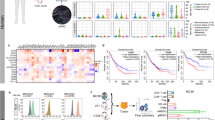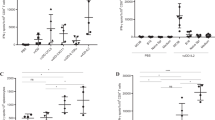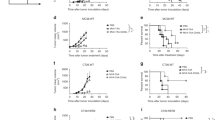Abstract
An adenovirus vector carrying the human Reduced Expression in Immortalized Cell (REIC)/Dkk-3 gene (Ad-REIC) mediates simultaneous induction of cancer-selective apoptosis and augmentation of anticancer immunity. In our preclinical and clinical studies, in situ Ad-REIC gene therapy showed remarkable direct and indirect antitumor effects to realize therapeutic cancer vaccines. We herein aimed to confirm the induction of tumor-associated antigen-specific cytotoxic T lymphocytes (CTLs) by Ad-REIC. Using an ovalbumin (OVA), a tumor-associated antigen, expressing E.G7 tumor-bearing mouse model, we investigated the induction and expansion of OVA-specific CTLs responsible for indirect, systemic effects of Ad-REIC. The intratumoral administration of Ad-REIC mediated clear antitumor effects with the accumulation of OVA-specific CTLs in the tumor tissues and spleen. The CD86-positive dendritic cells (DCs) were upregulated in the tumor draining lymph nodes of Ad-REIC-treated mice. In a dual tumor-bearing mouse model in the left and right back, Ad-REIC injection in one side significantly suppressed the tumor growth on both sides and significant infiltration of OVA-specific CTLs into non-injected tumor was also detected. Consequently, in situ Ad-REIC gene therapy is expected to realize a new-generation cancer vaccine via anticancer immune activation with DC and tumor antigen-specific CTL expansion.
This is a preview of subscription content, access via your institution
Access options
Subscribe to this journal
Receive 12 print issues and online access
$259.00 per year
only $21.58 per issue
Buy this article
- Purchase on Springer Link
- Instant access to full article PDF
Prices may be subject to local taxes which are calculated during checkout






Similar content being viewed by others
References
Tsuji T, Miyazaki M, Sakaguchi M, Inoue Y, Namba M . A REIC gene shows down-regulation in human immortalized cells and human tumor-derived cell lines. Biochem Biophys Res Commun 2000; 268: 20–24.
Veeck J, Dahl E . Targeting the Wnt pathway in cancer: the emerging role of Dickkopf-3. Biochim Biophys Acta 2012; 1825: 18–28.
Nozaki I, Tsuji T, Iijima O, Ohmura Y, Andou A, Miyazaki M et al. Reduced expression of REIC/Dkk-3 gene in non-small cell lung cancer. Int J Oncol 2001; 19: 117–121.
Kurose K, Sakaguchi M, Nasu Y, Ebara S, Kaku H, Kariyama R et al. Decreased expression of REIC/Dkk-3 in human renal clear cell carcinoma. J Urology 2004; 171: 1314–1318.
Qin SY, Liu ZM, Jiang HX, Ge LY, Tao L, Tang GD et al. Detection of reduced mRNA expression of REIC/Dkk-3 gene in human primary hepatocellular carcinoma. Chin J Hepatol 2006; 14: 775–776.
Kuphal S, Lodermeyer S, Bataille F, Schuierer M, Hoang BH, Bosserhoff AK . Expression of Dickkopf genes is strongly reduced in malignant melanoma. Oncogene 2006; 25: 5027–5036.
Nakamura RE, Hackam AS . Analysis of Dickkopf3 interactions with Wnt signaling receptors. Growth Factors (Chur, Switzerland) 2010; 28: 232–242.
Das DS, Wadhwa N, Kunj N, Sarda K, Pradhan BS, Majumdar SS . Dickkopf homolog 3 (DKK3) plays a crucial role upstream of WNT/beta-CATENIN signaling for Sertoli cell mediated regulation of spermatogenesis. PLoS One 2013; 8: e63603.
Fujii Y, Hoshino T, Kumon H . Molecular simulation analysis of the structure complex of C2 domains of DKK family members and beta-propeller domains of LRP5/6: explaining why DKK3 does not bind to LRP5/6. Acta Med Okayama 2014; 68: 63–78.
Monaghan AP, Kioschis P, Wu W, Zuniga A, Bock D, Poustka A et al. Dickkopf genes are co-ordinately expressed in mesodermal lineages. Mech Dev 1999; 87: 45–56.
de Wilde J, Hulshof MF, Boekschoten MV, de Groot P, Smit E, Mariman EC . The embryonic genes Dkk3, Hoxd8 Hoxd9 and Tbx1 identify muscle types in a diet-independent and fiber-type unrelated way. BMC Genom 2010; 11: 176.
Watanabe M, Kashiwakura Y, Huang P, Ochiai K, Futami J, Li SA et al. Immunological aspects of REIC/Dkk-3 in monocyte differentiation and tumor regression. Int J Oncol 2009; 34: 657–663.
Kinoshita R, Watanabe M, Huang P, Li SA, Sakaguchi M, Kumon H et al. The cysteine-rich core domain of REIC/Dkk-3 is critical for its effect on monocyte differentiation and tumor regression. Oncol Rep 2015; 33: 2908–2914.
Abarzua F, Sakaguchi M, Takaishi M, Nasu Y, Kurose K, Ebara S et al. Adenovirus-mediated overexpression of REIC/Dkk-3 selectively induces apoptosis in human prostate cancer cells through activation of c-Jun-NH2-kinase. Cancer Res 2005; 65: 9617–9622.
Tanimoto R, Abarzua F, Sakaguchi M, Takaishi M, Nasu Y, Kumon H et al. REIC/Dkk-3 as a potential gene therapeutic agent against human testicular cancer. Int J Mol Med 2007; 19: 363–368.
Shimazu Y, Kurozumi K, Ichikawa T, Fujii K, Onishi M, Ishida J et al. Integrin antagonist augments the therapeutic effect of adenovirus-mediated REIC/Dkk-3 gene therapy for malignant glioma. Gene Therapy 2014; 22: 146–154.
Shien K, Tanaka N, Watanabe M, Soh J, Sakaguchi M, Matsuo K et al. Anti-cancer effects of REIC/Dkk-3-encoding adenoviral vector for the treatment of non-small cell lung cancer. PLoS One 2014; 9: e87900.
Uchida D, Shiraha H, Kato H, Nagahara T, Iwamuro M, Kataoka J et al. Potential of adenovirus-mediated REIC/Dkk-3 gene therapy for use in the treatment of pancreatic cancer. J Gastroenterol Hepatol 2014; 29: 973–983.
Kashiwakura Y, Ochiai K, Watanabe M, Abarzua F, Sakaguchi M, Takaoka M et al. Down-regulation of inhibition of differentiation-1 via activation of activating transcription factor 3 and Smad regulates REIC/Dickkopf-3-induced apoptosis. Cancer Res 2008; 68: 8333–8341.
Tanimoto R, Sakaguchi M, Abarzua F, Kataoka K, Kurose K, Murata H et al. Down-regulation of BiP/GRP78 sensitizes resistant prostate cancer cells to gene-therapeutic overexpression of REIC/Dkk-3. Int J Cancer 2010; 126: 1562–1569.
Sakaguchi M, Huh NH, Namba M . A novel tumor suppressor, REIC/Dkk-3 gene identified by our in vitro transformation model of normal human fibroblasts works as a potent therapeutic anti-tumor agent. Adv Exp Med Biol 2011; 720: 209–215.
Sakaguchi M, Kataoka K, Abarzua F, Tanimoto R, Watanabe M, Murata H et al. Overexpression of REIC/Dkk-3 in normal fibroblasts suppresses tumor growth via induction of interleukin-7. J Biol Chem 2009; 284: 14236–14244.
Watanabe M, Nasu Y, Kumon H . Adenovirus-mediated REIC/Dkk-3 gene therapy: Development of an autologous cancer vaccination therapy (Review). Oncol Lett 2014; 7: 595–601.
Eikawa S, Nishida M, Mizukami S, Yamazaki C, Nakayama E, Udono H . Immune-mediated antitumor effect by type 2 diabetes drug, metformin. Proc Natl Acad Sci USA 2015; 112: 1809–1814.
Briseno CG, Murphy TL, Murphy KM . Complementary diversification of dendritic cells and innate lymphoid cells. Curr Opin Immunol 2014; 29: 69–78.
den Haan JM, Bevan MJ . Constitutive versus activation-dependent cross-presentation of immune complexes by CD8(+) and CD8(−) dendritic cells in vivo. J Exp Med 2002; 196: 817–827.
del Rio ML, Rodriguez-Barbosa JI, Kremmer E, Forster R . CD103− and CD103+ bronchial lymph node dendritic cells are specialized in presenting and cross-presenting innocuous antigen to CD4+ and CD8+ T cells. J Immunol (Baltimore, MD: 1950) 2007; 178: 6861–6866.
Joffre OP, Segura E, Savina A, Amigorena S . Cross-presentation by dendritic cells. Nat Rev Immunol 2012; 12: 557–569.
Bartlett DL, Liu Z, Sathaiah M, Ravindranathan R, Guo Z, He Y et al. Oncolytic viruses as therapeutic cancer vaccines. Mol Cancer 2013; 12: 103.
Andtbacka RH, Kaufman HL, Collichio F, Amatruda T, Senzer N, Chesney J et al. Talimogene laherparepvec improves durable response rate in patients with advanced melanoma. J Clin Oncol 2015; 33: 2780–2788.
Breitbach CJ, Parato K, Burke J, Hwang TH, Bell JC, Kirn DH . Pexa-Vec double agent engineered vaccinia: oncolytic and active immunotherapeutic. Curr Opin Virol 2015; 13: 49–54.
Edamura K, Nasu Y, Takaishi M, Kobayashi T, Abarzua F, Sakaguchi M et al. Adenovirus-mediated REIC/Dkk-3 gene transfer inhibits tumor growth and metastasis in an orthotopic prostate cancer model. Cancer Gene Ther 2007; 14: 765–772.
Kumon H, Sasaki K, Ariyoshi Y, Sadahira T, Ebara S, Hiraki T et al. Ad-REIC gene therapy: promising results in a patient with metastatic CRPC Following Chemotherapy. Clin Med Insights Oncol 2015; 9: 31–38.
de Araujo-Souza PS, Hanschke SC, Viola JP . Epigenetic control of interferon-gamma expression in CD8 T cells. J Immunol Res 2015; 2015: 849573.
Ichiyanagi T, Imai T, Kajiwara C, Mizukami S, Nakai A, Nakayama T et al. Essential role of endogenous heat shock protein 90 of dendritic cells in antigen cross-presentation. J Immunol (Baltimore, MD: 1950) 2010; 185: 2693–2700.
Imai T, Kato Y, Kajiwara C, Mizukami S, Ishige I, Ichiyanagi T et al. Heat shock protein 90 (HSP90) contributes to cytosolic translocation of extracellular antigen for cross-presentation by dendritic cells. Proc Natl Acad Sci USA 2011; 108: 16363–16368.
Heath WR, Belz GT, Behrens GM, Smith CM, Forehan SP, Parish IA et al. Cross-presentation, dendritic cell subsets, and the generation of immunity to cellular antigens. Immunol Rev 2004; 199: 9–26.
Kawasaki K, Watanabe M, Sakaguchi M, Ogasawara Y, Ochiai K, Nasu Y et al. REIC/Dkk-3 overexpression downregulates P-glycoprotein in multidrug-resistant MCF7/ADR cells and induces apoptosis in breast cancer. Cancer Gene Ther 2009; 16: 65–72.
Hirata T, Watanabe M, Kaku H, Kobayashi Y, Yamada H, Sakaguchi M et al. REIC/Dkk-3-encoding adenoviral vector as a potentially effective therapeutic agent for bladder cancer. Int J Oncol 2012; 41: 559–564.
Fujio K, Watanabe M, Ueki H, Li SA, Kinoshita R, Ochiai K et al. A vaccine strategy with multiple prostatic acid phosphatase-fused cytokines for prostate cancer treatment. Oncol Rep 2015; 33: 1585–1592.
Acknowledgements
This work was supported by JSPH KAKENHI Grant Numbers 15H04974, 15H04297 and 26462413.
Author information
Authors and Affiliations
Corresponding author
Ethics declarations
Competing interests
Okayama University and Momotaro-Gene Inc. are applying for patents on the Ad-REIC systems. MW, YN and HK are the inventors of the patents and own stock in Momotaro-Gene Inc. The remaining authors declare no conflict of interest.
Rights and permissions
About this article
Cite this article
Ariyoshi, Y., Watanabe, M., Eikawa, S. et al. The induction of antigen-specific CTL by in situ Ad-REIC gene therapy. Gene Ther 23, 408–414 (2016). https://doi.org/10.1038/gt.2016.7
Received:
Revised:
Accepted:
Published:
Issue Date:
DOI: https://doi.org/10.1038/gt.2016.7
This article is cited by
-
Novel extracellular role of REIC/Dkk-3 protein in PD-L1 regulation in cancer cells
Journal of Molecular Medicine (2023)
-
Adenovirus vector carrying REIC/DKK-3 gene: neoadjuvant intraprostatic injection for high-risk localized prostate cancer undergoing radical prostatectomy
Cancer Gene Therapy (2016)



